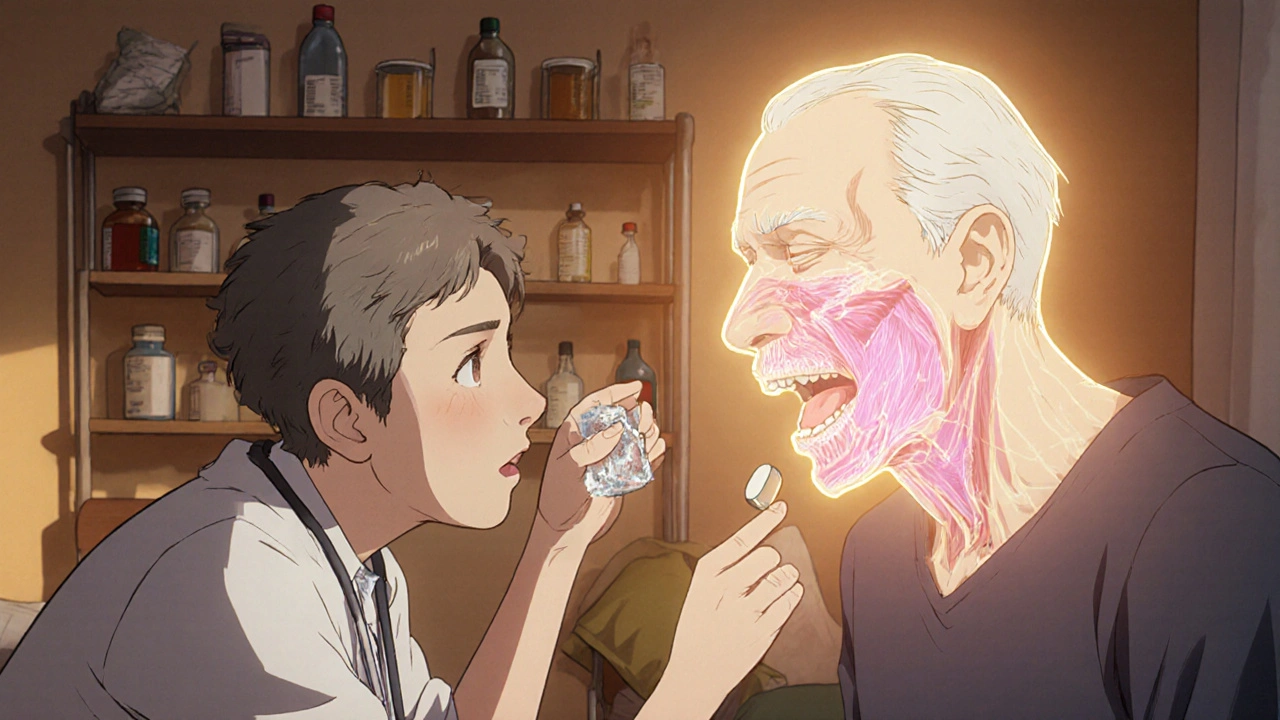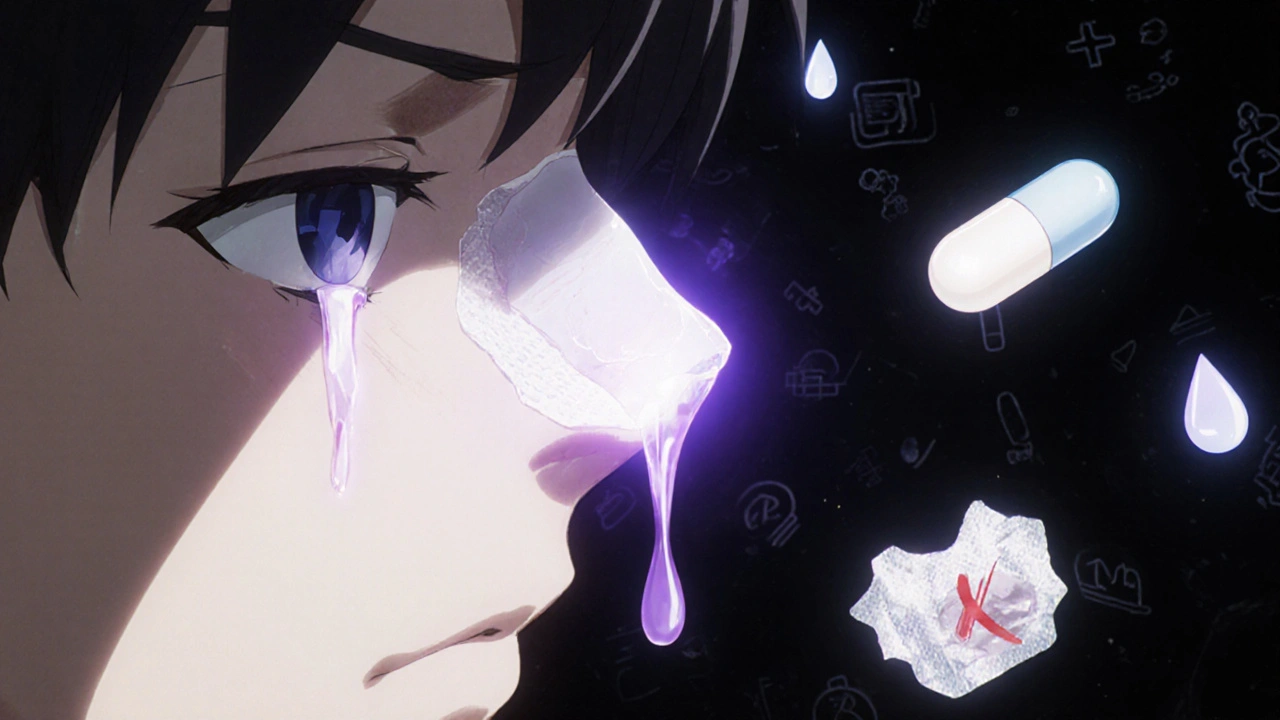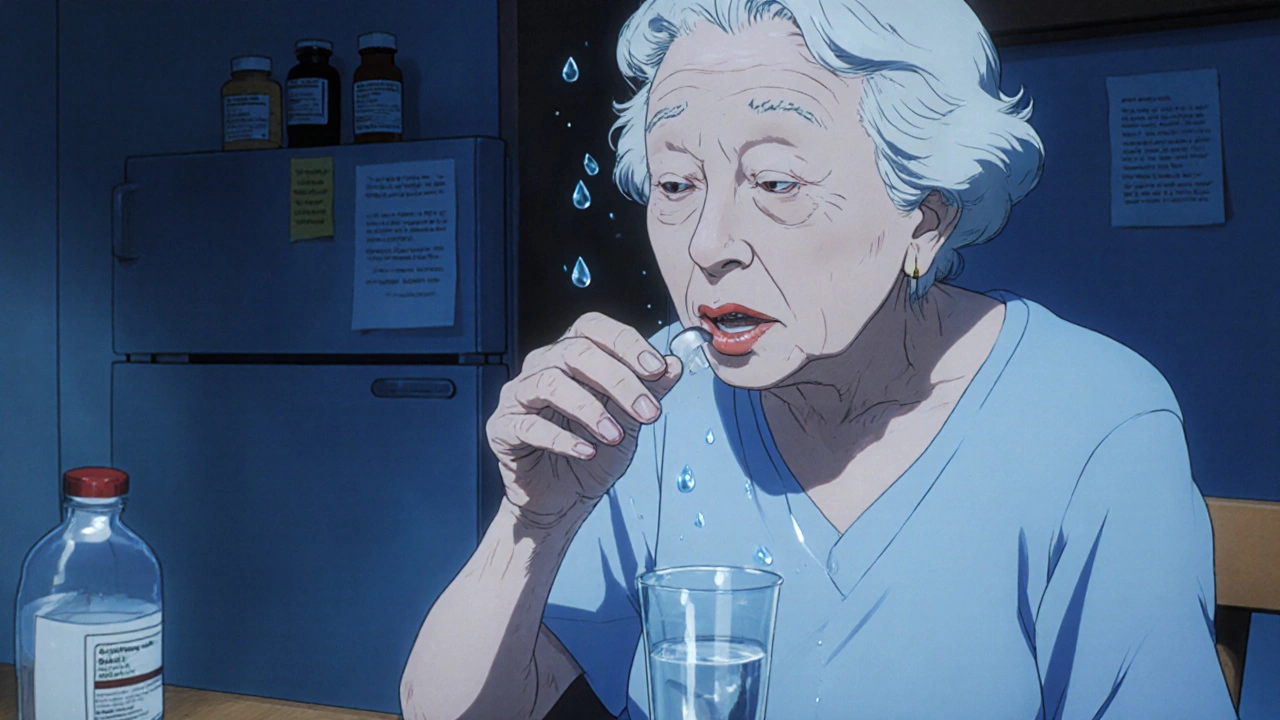If you or someone you care for struggles to swallow pills, you’re not alone. About 1 in 7 older adults living at home have trouble swallowing medications - and in nursing homes, that number jumps to nearly 7 out of 10. This isn’t just inconvenient. It’s dangerous. Skipping doses because a pill feels stuck can turn a manageable condition into a crisis. The good news? There are real, safe ways to make taking medicine easier - without crushing pills or guessing what’s safe.
Why Swallowing Pills Gets Harder With Age
Swallowing isn’t just a reflex. It’s a complex dance between muscles, nerves, and coordination. As we age, or if we’ve had a stroke, Parkinson’s, dementia, or even long-term acid reflux, that system can slow down or misfire. The throat muscles weaken. The sensation of food or pills getting stuck becomes more common. Some people describe it like a lump in the throat that won’t go away, even when nothing’s there. This isn’t just about discomfort. When people can’t swallow pills, they stop taking their blood pressure meds, their heart drugs, their diabetes pills - and their health crashes. A 2023 study found that nearly half of all pill modifications (like crushing or opening capsules) were done incorrectly. Some of those changes made the medicine less effective. Others raised the risk of overdose or serious side effects.What NOT to Do: The Hidden Dangers of Crushing Pills
It’s tempting. You crush a pill into applesauce. You open a capsule and mix it with yogurt. You think you’re helping. But many medications are designed to release slowly, protect the stomach, or target specific areas of the body. Crush them, and you destroy that design. Take extended-release painkillers like oxycodone OxyContin. Crush them, and you get the full dose all at once - a potential overdose. Some blood thinners, like warfarin, become unpredictable when altered. Certain antibiotics lose their effectiveness. Even something as simple as a coated tablet can become bitter and hard to swallow once crushed, making the person less likely to take it again. The UK’s National Institute for Health and Care Excellence (NICE) says: never alter a pill unless you’ve checked with a pharmacist or doctor first. And even then, only if there’s no better option.What Works: Safer Alternatives to Crushing
There are smarter ways to get medicine down - without risking your health. Ask for liquid versions. Many common drugs - from blood pressure pills to antidepressants - come in liquid form. Ask your pharmacist. It’s often cheaper than you think, and much easier to swallow. Some liquids are flavored, too. Try orodispersible tablets. These dissolve on your tongue. No water needed. They’re made for people with swallowing issues. Common ones include some antipsychotics, anti-nausea meds, and even certain heart medications. Look for capsules instead of tablets. Capsules are usually smoother and easier to swallow than flat, round tablets. And torpedo-shaped capsules? Even better. They slide down more easily. Use the lean-forward trick. This isn’t a myth. A clinical study from the University of Michigan found that people who used this method improved their capsule-swallowing success by 75%. Here’s how: Place the capsule on your tongue. Take a sip of water - not too much, not too little. Then, tilt your chin down toward your chest and swallow. The motion helps the capsule float down naturally. Try ice chips. If your mouth feels dry or sticky, suck on an ice chip before swallowing. It clears debris, numbs the throat slightly, and makes the next swallow easier.
When You Need Help: Talk to the Right People
This isn’t something you should handle alone. You need a team. Start with your pharmacist. They know what formulations exist, what can be safely crushed, and what alternatives are available. Many pharmacies now offer medication reviews just for this reason. Next, ask for a speech-language pathologist (SLP). These are the swallowing experts. They don’t just test if you can swallow. They teach you techniques - like how to change your head position, how to thicken liquids, or how to use specific swallowing exercises. A 2024 report from the American Speech-Language-Hearing Association says SLPs can reduce medication errors by up to 60% in older adults. Your doctor should be part of this too. Don’t wait until you miss a dose. Ask: “Is this medicine still necessary? Is there a better form?” Sometimes, the best solution is stopping a drug that’s no longer needed.New Tech Making Swallowing Easier
The pharmaceutical industry is finally catching up. Dissolvable films - thin sheets that stick to the inside of your cheek and release medicine - are now available for some medications. One brand, VersaFilm, showed 85% adherence in patients with moderate swallowing problems in a 2023 study. That’s huge. Newer liquid suspensions are being developed with better taste and longer shelf life. Some companies are even designing pills with textured coatings that help them slide down easier. The FDA and European Medicines Agency now require manufacturers to label whether a pill can be crushed. Look for “not for crushing” or “swallow whole” on the box. If it’s not labeled, ask your pharmacist.
For Caregivers: How to Help Without Making Things Worse
If you’re helping someone else take their medicine, here’s what works:- Always check the label or ask a pharmacist before mixing pills with food.
- Use a small spoon or syringe for liquids - never a big gulp.
- Give one pill at a time. Don’t pile them up.
- Keep water nearby, but don’t force it. Some people do better with thicker liquids like smoothies or milk.
- Watch for coughing, choking, or wet voice after swallowing. These are warning signs.
- Keep a log: which meds were taken, which were skipped, what method was used.
What to Do If Nothing Seems to Work
If you’ve tried everything - liquids, capsules, techniques, ice chips - and swallowing is still a battle, don’t give up. There are other routes. Some medicines come as patches (skin), suppositories (rectal), or even inhalers. Your doctor might be able to switch you to one of these. For example, pain meds can sometimes be given as patches. Nausea meds as suppositories. Hormones as gels. And if the person is on a feeding tube? There are special guidelines. Never mix meds directly into the feeding formula. Flush the tube with 10ml of water before and after each drug. Give one at a time. Use liquid forms when possible. Tube feeding isn’t a free pass to crush pills - it can still cause blockages or reduce effectiveness.Final Thought: Your Meds Are Only Useful If You Take Them
Taking medicine shouldn’t feel like a battle. If swallowing is a problem, it’s not your fault. It’s a medical issue - and like any medical issue, it deserves a smart solution. Don’t assume you have to suffer through pills. Don’t assume crushing is safe. Don’t assume your doctor knows what’s happening at home. Ask. Check. Try alternatives. Talk to your pharmacist. Bring up swallowing difficulties the next time you see your doctor. You’re not being difficult. You’re being smart. The goal isn’t just to take your medicine. It’s to take it safely - every time.Can I crush my pills if I mix them with food?
Only if a pharmacist or doctor says it’s safe. Many pills - especially extended-release, enteric-coated, or capsule-form drugs - lose their effectiveness or become dangerous when crushed. Mixing with food doesn’t make it safe. Always check first.
What’s the easiest way to swallow a capsule?
Try the lean-forward method: Place the capsule on your tongue, take a medium sip of water, then tilt your chin down toward your chest as you swallow. Studies show this works for 75% of people who struggle with capsules.
Are liquid medicines as effective as pills?
Yes, if they’re the same active ingredient. Liquid forms are often just as effective - and sometimes more reliable because they’re absorbed faster and don’t require swallowing. Ask your pharmacist if a liquid version exists for your medication.
Why do some pills feel harder to swallow than others?
Size, shape, and coating matter. Large, flat tablets are harder than small, torpedo-shaped capsules. Coated pills slide more easily. Uncoated or chalky pills can stick in the throat. If you struggle with one pill, ask if there’s a different brand or formulation.
Can speech therapists help with swallowing pills?
Yes. Speech-language pathologists specialize in swallowing disorders. They can teach you techniques like head positioning, swallowing exercises, and how to modify food or liquid textures to make pills easier to take. Many people see big improvements after just one or two sessions.
What should I do if I accidentally crush a pill that shouldn’t be crushed?
Stop taking it. Call your pharmacist or doctor immediately. Don’t take another dose until you get advice. If you feel dizzy, nauseous, or your heart races, seek medical help right away - you may have taken too much too fast.


 Medications
Medications
Skye Hamilton
November 28, 2025 AT 15:37So i heard crushin pills is like settin a time bomb in your stomach 😅
Hannah Magera
November 30, 2025 AT 13:57My grandma used ice chips before her meds and it changed everything. No more gagging, no more stress. Simple trick, huge difference.
Also she switched to liquid lisinopril-tastes like cherry, costs less than coffee. Pharmacist was shocked she hadn’t tried it sooner.
Don’t let pride stop you from asking. Everyone’s just trying to stay alive here.
Jacob Hepworth-wain
December 1, 2025 AT 12:25Lean-forward trick works like magic. I used to gag on every capsule until I tried it. Now I do it without thinking.
Also-capsules over tablets every time. If your med comes in both, ask for the capsule. It’s not a big deal to request.
And yeah, don’t crush anything unless you’ve talked to your pharmacist. I’ve seen people mix warfarin into applesauce and wonder why they ended up in ER.
Denise Wiley
December 3, 2025 AT 02:12I used to hate giving my dad his meds. He’d cry because he felt like he was choking. Then we found orodispersible tablets for his antidepressant. He takes them like candy now.
He didn’t tell anyone for months because he thought it was just ‘getting old.’
It’s not aging. It’s a medical thing. And you deserve to take your meds without fear.
Thank you for writing this. I’m sharing it with everyone I know.
Olivia Gracelynn Starsmith
December 4, 2025 AT 02:39My pharmacist actually has a printed handout on safe pill-swallowing techniques. I didn’t even know they offered that.
She also told me that some meds can be mixed with pudding or applesauce-just not all. Always ask.
And yes, speech therapists are unsung heroes. My mom went for two sessions and now she takes all her meds like a pro. No more hiding them in her cheek.
Healthcare is better when you ask questions. Don’t be shy.
Maria Romina Aguilar
December 4, 2025 AT 04:43...I’m just saying... what if the real problem is that we’re giving people too many pills?...
What if we stopped prescribing so much?...
What if the system is broken and we’re just teaching people how to swallow the symptoms instead of fixing the root?...
...I’m not against helping... I just think we’re putting bandaids on a hemorrhage...
...and I’m not saying crushing pills is safe... I’m saying maybe we shouldn’t be giving them in the first place...
...I mean... look at the stats... 7 out of 10 in nursing homes... isn’t that a red flag?...
...I’m not being difficult... I’m being thoughtful...
...and I’m not sure if this is the right place to say this...
...but... maybe... we should be talking about deprescribing...
...not just swallowing...
...I’m just saying...
...I didn’t mean to start a debate...
...I just...
...thought...
...maybe...
...
Brandon Trevino
December 5, 2025 AT 19:39While the advice provided is generally sound, the article fails to address the pharmacokinetic implications of altered drug formulations in patients with dysphagia. The assumption that liquid formulations are universally equivalent to solid dosage forms is empirically unsound. Bioavailability varies significantly based on gastric pH, first-pass metabolism, and excipient interactions. Furthermore, the assertion that speech-language pathologists reduce medication errors by 60% lacks citation from peer-reviewed literature. The referenced 2024 report from ASHA is not publicly accessible in its entirety, and the statistical claim appears extrapolated from a small cohort study. Until the evidence base is substantiated with controlled trials, such assertions risk misleading clinical decision-making. I recommend consulting the FDA’s Guidance for Industry on Modified Release Products prior to altering any dosage form.
Craig Hartel
December 6, 2025 AT 08:50My cousin in Japan uses these little dissolvable films for his blood pressure med. No water, no swallowing struggle. Just stick it on the roof of your mouth and it’s gone.
They’re not available everywhere yet, but they’re coming. I told my pharmacist and she said they’re testing them in a few U.S. hospitals.
It’s not magic-it’s progress. And we’re getting there.
Keep asking. Keep pushing. Someone’s got to make this easier for the next person.